

Celebrating Employees to Create the Customer Experience -Six Seconds. Working with an amazing org on bringing emotional intelligence more fully into their culture in order to create a better customer experience.
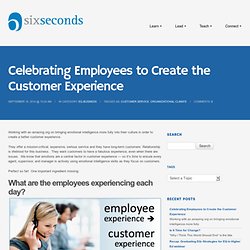
They offer a mission-critical, expensive, serious service and they have long-term customers: Relationship is lifeblood for this business. They want customers to have a fabulous experience, even when there are issues. We know that emotions are a central factor in customer experience — so it’s time to ensure every agent, supervisor, and manager is actively using emotional intelligence skills as they focus on customers. Perfect so far! Social Intelligence and Leadership. Home - Brené Brown. More Postcards Every Manager Needs on their Wall -Six Seconds. Imagine a soccer team striving to win in a competitive league.

But the team has no data about how many goals they’ve scored, or even who’s a great striker versus defender. The gift of gratitude -Six Seconds. It’s Thanksgiving in the US and the traditional start of the Holiday season.
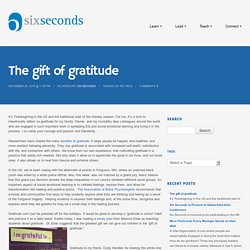
For me, it’s a time to intentionally reflect on gratitude for my family, friends, and my incredibly dear colleagues around the world who are engaged in such important work in spreading EQ and social emotional learning and living it in the process. I so value your courage and passion and friendship.
Trend tv. TREND HUNTER - #1 in Trends - Fashion Trends, Tech, Style, Design & Pop Culture. Goodness to Greatness Leadership-Seven Steps. Stephen Covey on Developing Emotional Intelligence. Intelligence is Overrated: What You Really Need to Succeed « Talesfromthelou's Blog. –by Keld Jensen, Original Story, May 05, 2012 Albert Einstein’s was estimated at 160, Madonna’s is 140, and John F.
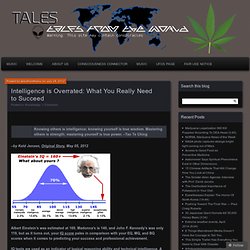
Kennedy’s was only 119, but as it turns out, your IQ score pales in comparison with your EQ, MQ, and BQ scores when it comes to predicting your success and professional achievement. Motivation and Success Quotes, Part 3. Leading With Heart Centred Emotional Intelligence - Dee Harding. Dee Harding asks – what has heart-centred emotional intelligence got to do with leadership?
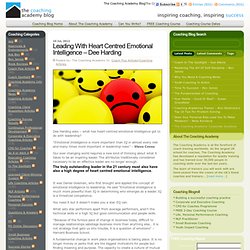
“Emotional Intelligence is more important than IQ in almost every role and many times more important in leadership roles” – Steve Covey Our ever changing world requires a new kind of thinking about what it takes to be an inspiring leader. The attributes traditionally considered necessary to be an effective leader are no longer enough. The truly outstanding leader in the 21 century must also have also a high degree of heart centred emotional intelligence. Leadership and EQ - RealTime Leadership. In the past, it might have been true that leaders could succeed simply because they were smart.
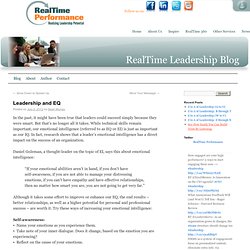
But that’s no longer all it takes. While technical skills remain important, our emotional intelligence (referred to as EQ or EI) is just as important as our IQ. In fact, research shows that a leader’s emotional intelligence has a direct impact on the success of an organization. EQ takes a lead over IQ - Academy. It has been established by research in the recent years that though IQ (intelligence quotient) is important for success in professional and personal life, emotional intelligence quotient (EQ) plays a far greater role in our success.
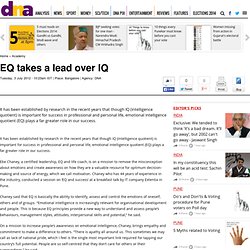
Ebe Chaney, a certified leadership, EQ and life coach, is on a mission to remove the misconception about emotions and create awareness on how they are a valuable resource for optimum decision-making and source of energy, which we call motivation. Chaney who has 44 years of experience in the industry, conducted a session on ‘EQ and success’ at a breakfast talk by IT company Extentia in Pune. Chaney said that EQ is basically the ability to identify, assess and control the emotions of oneself, others and of groups. Power Without Status Linked To Abuse, Study Says. Ever wonder why that clerk at the grocery store is giving you attitude?

A new study showing the relationship between power and status may have the answer. Individuals with some authority combined with little perceived status are more inclined to abuse power, say researchers. LeadBIG. How Mood Affects Negotiators. InShare7 What are social psychologists learning about the connections among emotions, negotiation, and decision making?

Negotiation contributor Jennifer S. Lerner of Harvard Kennedy School and her colleagues have identified two critical themes. First, they have studied the carryover of emotion from one episode, such as a car accident, to an unrelated situation, such as a workplace negotiation. Second, these researchers are studying the influence of specific emotions such as happiness, sadness, and anger on decision-making. In related work, Robert Lount and Keith J.
E-Newsletter June 2012: 10 New Leadership Skills. Plus, What Stays the Same? The Leadership Impact of Rationalizing Away Your Gut Instinct. I am spending some time on an island with my extended family and yesterday when I made my daily Dunkin’ Donuts run I ordered a coffee for my mom: a small coffee with skim milk.
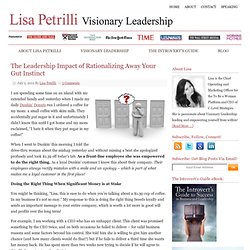
They accidentally put sugar in it and unfortunately I didn’t know this until I got home and my mom exclaimed, “I hate it when they put sugar in my coffee!” When I went to Dunkin’ this morning I told the drive-thru woman about the mishap yesterday and without missing a beat she apologized profusely and took $1.39 off today’s tab. New Data Reveals How To Attract And Retain Your Best Staff. As you sit at your desk today, two-thirds of the team around you are either looking for a new job or have every intention of doing so later this year. That's just one of the findings from the Kelly Global Workforce Index, key stats from which are presented in the following Infographic.
What grabbed my attention is the data about different generations. Baby boomers quite clearly gain career fulfilment in different ways to the younger generations. Do your recruitment campaigns already play to these differences, or is that something to work on? How about your internal retention strategies? 75 Affirmations for Personal Development. Affirmations are one way to develop new beliefs that can eventually become second-nature. Every morning or evening we can repeat these affirmations with a clear and focused mind, and with practice these beliefs can take hold inside our brains. One caveat, however, is to make sure that the affirmations you repeat to yourself are congruent with reality, and aligned with your core values.
I’ve seen many people come up with delusional affirmations and then attempt to ingrain them into their minds. Even when they do succeed, those beliefs can be detrimental. Please be aware of the meaning and intention behind the affirmation before you decide to “program it” into your mind. The following is just a list of suggestions on some of the affirmations you may want to practice. Does Shopping Make Us Happy? Last night I was talking with Daniel Goleman about our upcoming webinar during the 24EQ Virtual Conference — his session is leveraging emotional intelligence to create environmental and business sustainability. Here’s how to sign up – - some seats are still available and the event is free. The Thought-Patterns of Success - Elizabeth Grace Saunders. By Elizabeth Grace Saunders | 1:50 PM April 30, 2012 Your passion for your career can sabotage your attempts to succeed. When you go from feeling energized, excited and in control of your work to feeling an overwhelming compulsion to achieve and produce, you’ve tipped from helpful harmonious passion into harmful obsessive passion.
But when you’ve grown accustomed to operating from a state of obsessive passion, you may want to act differently, but you just don’t know how. Your deeply ingrained mental and behavioral patterns naturally lead you toward seemingly uncontrollable compulsion to work. Paradoxically, these natural reflexes inhibit the quality of your professional output. Fortunately, there is hope. If you think you might have fallen into the trap of obsessive passion, go through this list and ask yourself: Do I agree with any of the harmful thought patterns? If the answer is “yes,” you can incorporate more helpful thought patterns into your life through these types of activities: